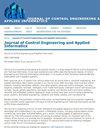Synchronization Control for Discrete-Time Delayed Complex Cyber-Physical Networks Under False Data Injection Attacks
IF 0.6
4区 计算机科学
Q4 AUTOMATION & CONTROL SYSTEMS
引用次数: 0
Abstract
This paper is concerned with the synchronization control problem for discrete-time complex cyber-physical networks with mixed delays and false data injection attacks. The polytopic model of closed-loop synchronization error dynamics is established by considering the pattern characteristics of false data injection attacks and input delays, which has essentially different from the traditional handling method. More specifically, the proposed polytopic model utilizes the current state of the closed-loop synchronization error dynamics, thereby facilitating the reduction of possible conservatism. In such a framework, a nonlinear synchronization control method is developed to eliminate the negative impact of cyber attacks, and sufficient conditions are derived to guarantee that the closed-loop error dynamics ultimately exponentially bounded. In the meanwhile, the design procedure of the synchronization controller is proposed for underlying complex cyber-physical networks subject to mixed delays and false data injection attacks. Finally, an illustrative example is delivered to demonstrate the effectiveness of the proposed method. DOI: 10.61416/ceai.v25i3.8360伪数据注入攻击下离散时延复杂网络的同步控制
研究了具有混合延迟和虚假数据注入攻击的离散时间复杂网络的同步控制问题。考虑假数据注入攻击和输入延迟的模式特征,建立闭环同步误差动力学的多面体模型,与传统的处理方法有本质区别。更具体地说,所提出的多面体模型利用了闭环同步误差动力学的当前状态,从而有助于减少可能的保守性。在此框架下,提出了一种消除网络攻击负面影响的非线性同步控制方法,并推导了保证闭环误差动力学最终呈指数有界的充分条件。同时,针对存在混合时延和虚假数据注入攻击的底层复杂网络,提出了同步控制器的设计方法。最后,通过实例验证了该方法的有效性。DOI: 10.61416 / ceai.v25i3.8360
本文章由计算机程序翻译,如有差异,请以英文原文为准。
求助全文
约1分钟内获得全文
求助全文
来源期刊
CiteScore
1.50
自引率
22.20%
发文量
0
审稿时长
6 months
期刊介绍:
The Journal is promoting theoretical and practical results in a large research field of Control Engineering and Technical Informatics. It has been published since 1999 under the Romanian Society of Control Engineering and Technical Informatics coordination, in its quality of IFAC Romanian National Member Organization and it appears quarterly.
Each issue has up to 12 papers from various areas such as control theory, computer engineering, and applied informatics. Basic topics included in our Journal since 1999 have been time-invariant control systems, including robustness, stability, time delay aspects; advanced control strategies, including adaptive, predictive, nonlinear, intelligent, multi-model techniques; intelligent control techniques such as fuzzy, neural, genetic algorithms, and expert systems; and discrete event and hybrid systems, networks and embedded systems. Application areas covered have been environmental engineering, power systems, biomedical engineering, industrial and mobile robotics, and manufacturing.

 求助内容:
求助内容: 应助结果提醒方式:
应助结果提醒方式:


